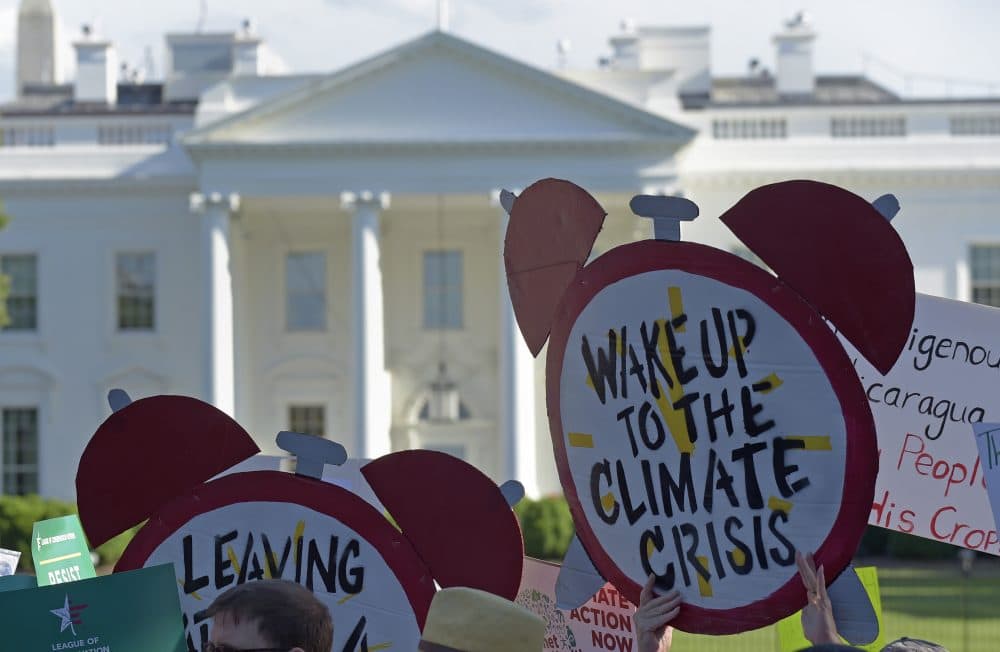Advertisement
Why Cold Snaps Don't Disprove Climate Change
Resume
When temperatures drop to record lows in the fall and winter months, a debunked talking point often begins to circulate once again: Cold weather disproves climate change. Even President Trump has added fuel to the theory, tweeting last year, "Brutal and Extended Cold Blast could shatter ALL RECORDS - Whatever happened to Global Warming?"
However, weather and climate are two different things, and “it's just flawed logic to identify a cold day or a week with disproving climate change,” explains Marshall Shepherd, an atmospheric sciences professor at the University of Georgia, former president of the American Meteorological Society and host of the "Weather Geeks" podcast.
“I often say weather is your mood, and climate is your personality,” Shepherd tells Here & Now’s Robin Young. “One day's weather, even the week's weather, doesn't say anything about climate, because climate is really the statistical properties of long-term weather.
“I had breakfast this morning too, and that doesn't mean we alleviated world hunger — and that's what that logic is like.”
Interview Highlights
On why the term climate change is more accurate than global warming, and the difference between the climate and the weather
“When we have the flu, you have a fever — that's one symptom of the flu. There are other symptoms. With climate change, there are other facets of climate change: the frequency intensity of hurricanes, how often cloudiness occurs where you live, sea level rise. So, warming temperatures is just one response of the changing climate system, so it's just a better way of framing it. It wasn't a name change, because it stopped warming. It's simply a better representation of what's happening to the climate system.
“Our weather is actually governed by a series of wave patterns in the jet stream. People are familiar with the high pressure and low pressure, and ... this past week into the Thanksgiving, we were in one of those troths of low pressure, and so cold air could ooze down into the mid-Atlantic and northeast. That's just weather. But climate is the overall, statistical, long term averages of those properties and changes.
“So, to say that because it's cold this week [that’s] a refutation of climate change, it's just flawed. But more importantly, let me add to that. If you look around the globe over the past week, it's still relatively warm, so we have to be careful not to be so U.S.-centric or even northeast U.S.-centric in describing what's happening globally.”
On how extremes in the weather are expected as the climate changes
“There's research by colleagues like Jennifer Francis at Rutgers and many others in the peer-reviewed literature [community] that suggest that jet stream patterns are becoming wavier because of changes up in the Arctic, in terms of the loss of sea ice and ice cover-up there. That affects our jet stream pattern and counterintuitively might lead to more extremes on both sides — whether it be drought and flood, or cold and warm — because we get these higher amplitude wave patterns in the jet stream.”
On what in the recently-released National Climate Assessment stuck out the most to him
“What hit me about this report is, I've often been very critical of what I call 'report fatigue.' We just put out report after report, and it doesn't resonate with the public, but what I found about this fourth National Climate Assessment that is important is it documented what's happening in the here and now. It focuses on ‘kitchen table’ issues for the American citizens, and the global citizens at that. It talks about the impacts on economy, health, water resources, things that are happening now. It doesn't put it far off in the distance, it doesn't talk about polar bears, and that's what we need more of with these types of reports — not just all the graphs and jargon.”
On how the report says farmers in the Midwest will be among the hardest hit by climate change
“They grow things that we eat globally, so when we buy popcorn and when we go to buy bread or dairy, those are impacts on our bottom-line issues in our own homes. It's not just about polar bears.”
Chris Bentley produced and edited this interview for broadcast. Jackson Cote adapted it for the web.
This segment aired on November 26, 2018.
